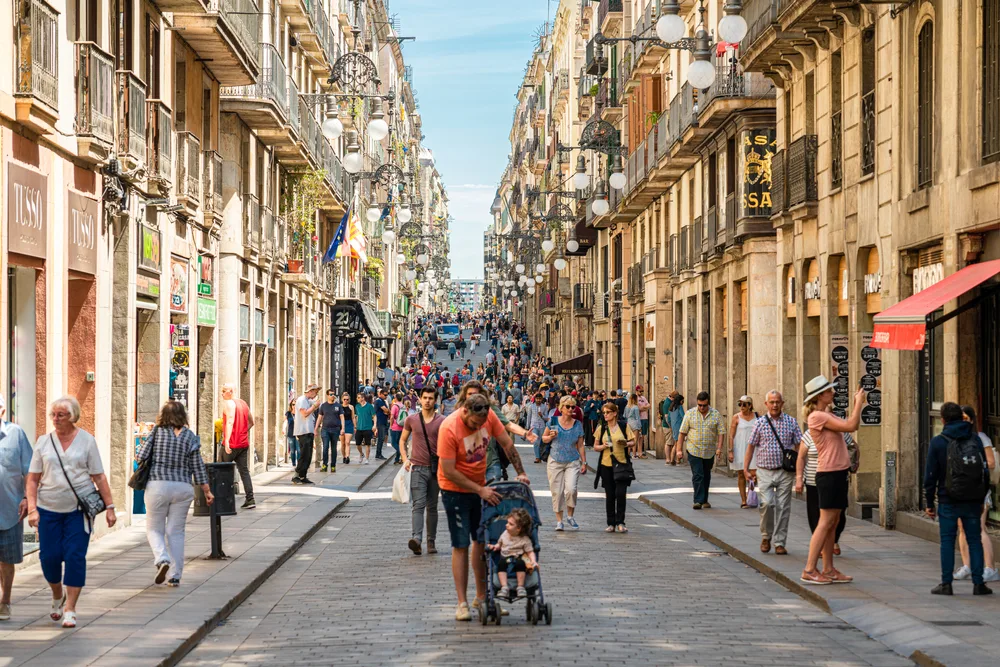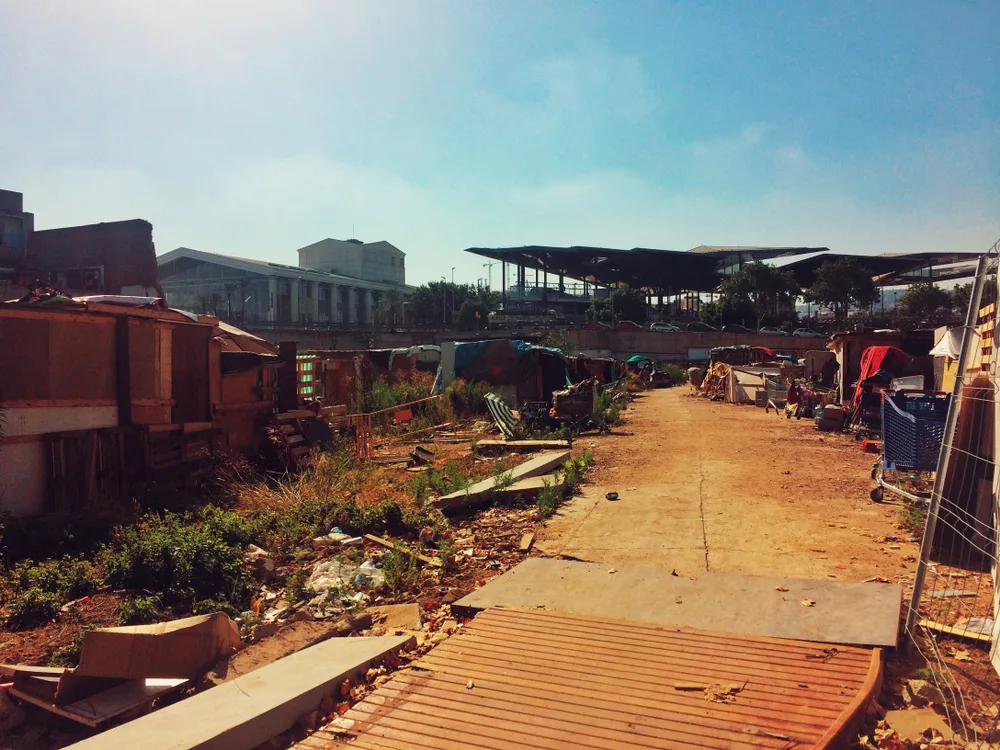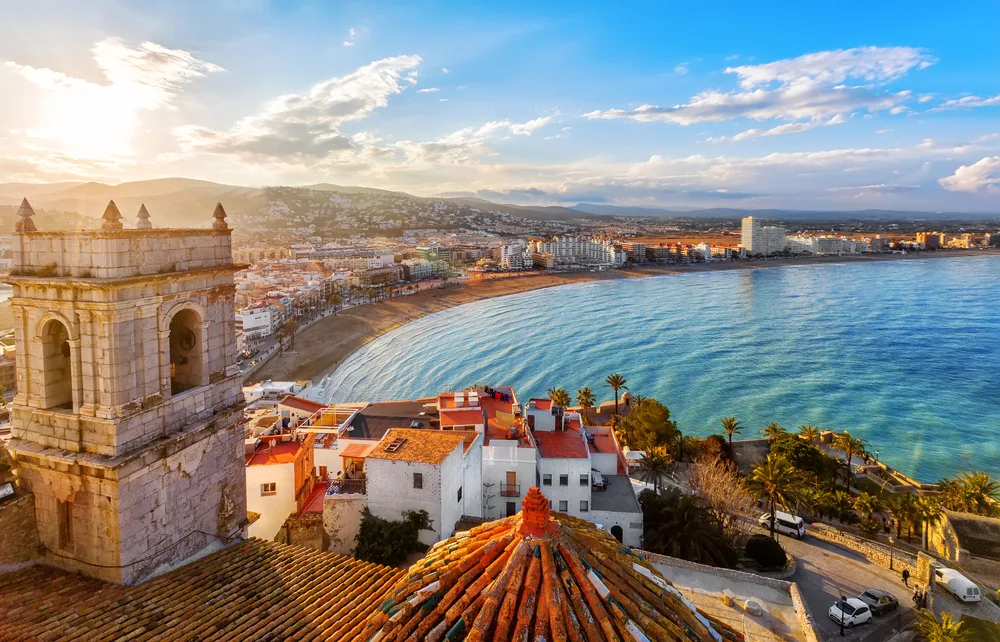Spain is one of the most visited countries in the world, coming in at #3, to be precise. Over 75 million people visit each year, hoping to take in the charms of this amazing country.
Spain’s big metropolises of Madrid and Barcelona attract the most visitors. Many visitors also flock to Andalusia in southern Spain to take in the unique combination of Islamic and European culture.
Its small towns such as Ronda provide a calmer insight into centuries of history, and of course, no list of Spain’s main tourist attractions would be complete without mentioning the beautiful beaches.
But while there’s countless historical and cultural sights to explore, is Spain safe to visit? We’ll explain all you need to know below.
Is Spain Safe to Visit in 2026?

SJ Travel and Video/Shutterstock
Yes. Spain is very safe to visit. However, the petty crime rate in many tourist attractions, especially in the big cities of Barcelona and Madrid, is very high.
There is also a risk of more violent crimes, including terrorism, but these risks are minimal. Most foreign countries agree that Spain is mostly a safe place to visit, although they advise citizens to exercise some caution.
New Zealand tells its citizens to exercise increased caution when visiting Spain. The United States also places Spain under a Level Two travel advisory.
These warnings are nothing to be afraid of, but it is good to read up on potential problems you might face in Spain, so you know how to prepare. Most travel advisories for Spain list a few common concerns for travelers in Spain.
These concerns include:
- Civil unrest
- Terrorism
- Pickpocketing
- Bag snatching
- Road crime
- Fraud
Some of these potential dangers seem life-threatening, but the truth is that violent events are rare in Spain.
Since they have occurred in the past, countries have an obligation to warn their citizens and err on the side of caution. Civil unrest is common in Spain, especially in certain regions.
From 2019 to 2021, the semi-autonomous region of Catalonia in the northeast, especially its capital Barcelona, was rocked with protests as many demonstrators called for full independence (Catalans speak their own language and many see themselves as distinct from Spain).
The Basque region on the northwestern coast is another region that has seen calls for independence.
The Basque region had an active secessionist movement, spearheaded by the terrorist group ETA, but the group and the Spanish government formally signed a ceasefire in 2011.
Since then, the Basque region has been peaceful and prosperous, although small demonstrations sometimes happen. It’s still good to know this political context so you don’t offend any local acquaintances when you are in the region.
In terms of natural disasters, you don’t have to worry much in Spain. If you visit some parts of Spain, such as the Canary Islands, you could encounter volcanic eruptions.
Summers are hot and dry in Spain, often causing forest fires. As climate change ravages the Iberian Peninsula, the fire season starts earlier and earlier each year. You can check for any active fires on a map provided by local media.
Always monitor local news before and during your trip and follow any evacuation orders. There are certainly problems that you should be aware of when you visit Spain, but nothing that should change your mind about traveling there.
Crime in Spain

BARCELONA, SPAIN – JUNE 03, 2019: Crowd Of People In Central Downtown Barcelona City On Ferran Street (Carrer de Ferran)/Radu Bercan/Shutterstock
The crime rate in Spain is overall low, with the exception of petty crime. Although you may have heard horror stories about pickpockets and Spanish criminals, the reality on the ground is far safer than you might think.
In particular, the violent crime rate in Spain is very low. According to World Bank data, Spain’s homicide rate is only 1 incident per 100,000 people. The rate of other violent crimes is comparatively low.
Overall, Spain’s crime rate is very low. The rate is officially 48.8 incidents per 1,000 residents. The overall crime rate is one of the lowest in Europe. For most visitors, a trip to Spain may be safer than a trip to their hometown.
The crime rate in Spain differs drastically by region and by type of crime. The regions that receive the most tourists also experience the most crime.
The Balearic Islands top the list with 64 crimes per 1,000 people, followed by Catalonia and Madrid. Although your life and physical safety will probably not be endangered in Spain, your wallet is a different story.
Although Spain scores overall on the crime index, it scores a 43.10 out of 100 when it comes to property crimes such as vandalism and theft. This is backed up by anecdotal evidence.
Many travel blogs list Barcelona or Madrid as the worst cities in the world when it comes to pickpocketing. Analysts (and frustrated locals and city officials) have been scratching their heads for years trying to figure out why pickpocketing is so common in Barcelona in particular.
Some cite the lax punishments for pickpocketing, while others point to the massive scale of tourism that is unparalleled in many other places in Europe, let alone Spain.
If you are the victim of a crime while you are in Spain, the Spanish government advises you to contact the police immediately and file a report. There is even an official app called AlertCops that you can use to contact law enforcement.
Spain also has a designated Foreign Tourist Service that assists people after a crime with assistance in their native languages.
While crime is a problem in Spain, you can minimize your risk by choosing your destinations carefully and being very careful as you move out and about.
Pickpocketing
The biggest danger tourists are likely to encounter when visiting Spain is petty theft, especially pickpocketing. Pickpocketing is most common in Spain’s biggest cities, Barcelona and Madrid, and popular beach areas such as Ibiza and Mallorca.
The Canadian government lists places that are popular with pickpockets in its official travel advisory for Spain. In Madrid, be careful around public transportation such as the subway or Atocha train station, Puerta del Sol, Gran Via, Paseo del Prado, and Retiro park.
In Barcelona, be careful on the beach at Barceloneta, Las Ramblas, Park Guell, around the Sagrada Familia Basilica, and around the train, bus, and subway systems.
You should also be careful in the lobbies of Spain’s major airports, such as El Prat near Barcelona, as thieves take advantage of the crowds to take passports from tourists. The UK government says that there have been incidents at rental car desks or in baggage claim.
Thieves use a variety of tactics to take advantage of victims, often targeting tourists. The Australian government lists a few of these common tactics, including asking for directions or spilling something on you and offering to clean it up.
Thieves often work in groups. On the public transportation system, they will cause a disturbance or pile-up near subway car doors or on the platform, forcing victims to pass through a narrow gap.
You will have to take active precautions to make sure that you leave Spain with all of your valuables intact.
Never put all of your valuables in one place — put some cash in your purse and store the rest around your body. Keep your hand physically on your bag when you are in a crowd and invest in a money belt or a fanny pack to keep your valuables close by.
Under no circumstances should you leave your valuables unattended, even in a place that feels safe such as a hotel lobby or restaurant — that means no hanging your bags from the back of the chair.
Terrorism
Many countries mention the risk of terrorism in their travel advisory for Spain. The New Zealand government mentions that Spain has been the site of terrorist attacks in the past and that various terrorist groups have threatened to carry out actions here in the future.
The UK government lists recent terrorist attacks in its travel advisory. In January 2023, one person was killed when a terrorist attacked two churches in southern Spain.
A far deadlier incident occurred in 2017, when terrorists drove vehicles into crowds in Barcelona and Cambrils, killing 16 people and injuring many more.
The Spanish government’s official terrorist alert level is still set to Level 4, which is high. Although they are deadly, terrorist incidents in Spain tend to be sporadic, so it is unlikely that you will experience one when you visit.
There is also no way to reliably predict terrorism. You shouldn’t let the threat of terrorism lead you to cancel your vacation.
But still be reasonably alert in public areas with lots of crowds and leave first, ask questions later if you run into something suspicious. Always obey local alerts or instructions from authorities.
Avoiding Bad Areas

Barcelona, Spain, July 2018: Slums near National theatre/Javgeni Mironov/Shutterstock
A few precautions go a long way when traveling in Spain, including bad areas. Major tourist sites and public transportation in Madrid and Barcelona are not places that you should (or realistically could) avoid on a trip to Spain, but you should exercise precautions there.
These places are often hotspots for pickpockets. Spain sometimes struggles with inequality, and certain neighborhoods in its major cities are impoverished and have high crime rates.
These neighborhoods include La Cañada Real in Madrid and La Mina and El Raval in Barcelona. These neighborhoods are usually far away from any tourist destinations so they should be fairly easy to avoid.
Things to Consider
Here are a few additional safety tips to keep in mind when you visit Spain:
- Criminals sometimes pose as police officers, asking to see people’s wallet and ID, then running off with those documents. Always ask to see identification if an officer stops you and memorize what a uniform looks like.
- If you’re driving in Spain, be careful of someone coming up to you at a gas station with a sob story or creating a roadblock. While it’s possible that these are drivers in distress, it is more likely to be a ruse used by criminals to steal from vehicles.
- Avoid actions that can make you look like a tourist, such as flashing expensive jewelry, carrying a camera around your neck, or dressing too casually when you’re not at the beach.
- Many destinations in Spain are becoming more frustrated with the behavior of tourists, especially Barcelona. Be respectful and follow local norms. For example, don’t be intoxicated or urinate in public. The Spanish government put together a helpful trilingual pamphlet for tourist behavior.
Frequently Asked Questions

May_Lana/Shutterstock
Here are some common questions you may want to ask before going to Spain:
Is it safe for tourists in Spain?
Spain is mostly safe for tourists. However, you will have to keep a close eye on your valuables as pickpocketing is very common.
What are the risks of traveling to Spain?
Most of the risks of traveling to Spain have to do with your wallet. Street crimes such as pickpocketing are very common, especially in the bigger cities. There is also some risk of more violent crimes, especially terrorism.
What is the safest city in Spain?
If you want to experience a city in Spain without the adrenaline rush of having to hang on to your things in Barcelona or Madrid, your best bet is Valencia. Valencia has the lowest crime rate of any big city in Spain.
Is Spain safe for female travelers?
Spain is mostly safe for female travelers, although catcalling is common in some parts of Spain. Women are sometimes targeted by pickpockets because they have purses, so make sure you keep your bag close to your body.
Is the crime rate in Spain bad?
The overall crime rate in Spain is not bad. However, when you look at the petty crime rate, it is astronomical in some cities, so be careful.
So, Is Spain Safe to Visit?
Spain has one of the lowest overall crime rates in Europe and is a very safe place to visit. However, some cities have extremely high street crime rates, so you should keep a firm grip on your valuables.
So, with so much to see and do, what are you waiting for — book your trip to Spain and experience all this idyllic country has to offer. Happy travels!



